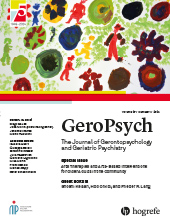Demenzservicestellen der M.A.S Alzheimerhilfe Österreich
Eine neue Struktur zur nicht-pharmakologischen Behandlung von Personen mit Demenz und deren Angehörige
Abstract
Die Wirksamkeit nicht-pharmakologischer (psychosozialer) Behandlungsmethoden konnten in wissenschaftlichen Untersuchungen gezeigt werden. Methoden der Angehörigenunterstützung können frühzeitige Institutionalisierung verhindern. Förderprogramme für Personen mit Demenz können helfen, Fähigkeiten länger zu erhalten und die Leistungsfähigkeit zu optimieren sowie die Lebensqualität trotz chronischem Verlauf der Krankheit zu erhalten. Flächendeckende Behandlungsstrukturen, welche spezialisiert sind, komplexe nicht-pharmakologische Behandlungen sowohl für Angehörige als auch für Betroffene anzubieten, sind noch selten. Der Vorteil derart spezialisierter Einrichtungen ist es, dass sie Angebote zur Verfügung stellen, die niederschwellig angelegt sind und somit eine frühzeitige Erkennung der Krankheit ermöglichen. Gleichzeitig bieten sie ideale Umgebungen für wissenschaftliche Studien und für die Entwicklung dringend benötigter Praxiskonzepte. Die M.A.S Alzheimerhilfe hat eine Behandlungsstruktur entwickelt, welche psychosoziale Unterstützung sowohl für den Betroffenen als auch für den Angehörigen bietet. Ergebnisse einer ersten Strukturanalyse werden präsentiert.
The effect of non-pharmacological (psychosocial) treatments has been shown in research studies. Caregiver support programs can prevent premature institutionalization. Training programs for persons with dementia have shown optimization of functioning and maintenance of life quality despite the chronic decline of cognitive abilities within the disease. Specialized treatment centers providing training as well as caregiver support for persons living at home are still rare. The advantage of such centers providing easy accessible, comprehensive individualized services promote the early detection of the disease and provide the possibility for recruiting appropriate participants for research studies. This research is desperately needed since non pharmacological treatments still lack broad acceptance and evidence. The Morbus Alzheimer Society Austria has opened three specialized nonpharmacological treatment centers over the last 6 years. First experiences are presented.
Literatur
(2000). Diagnostic and statistical manual of mental disorders – DSM-IV-TR (4th ed.). Washington, DC: Autor.
(2007). Alzheimer Krankheit. Management aus multidisziplinärer Sicht. CliniCum, Sonderausgabe November 2007.
(2005). Non-pharmacological treatment of AD: current data. International Psychogeriatrics, 17(suppl. 2), 36.
(2007). Nonpharmacological treatment for persons with Alzheimers disease. Neurodegenerative Disorders, 4(suppl 1), 337.
(2007). Entlastung pflegender Angehöriger. Ein Programm der M.A.S Alzheimerhilfe. Zeitschrift für Gerontopsychologie & -psychiatrie, 20, 169–174.
(1989). Effect of a training programme to reduce stress in carers of patients with dementia. British Medical Journal, 299, 1375–1379.
(2006). Predictors of improvement in social support: Five-year effects of a structured intervention for caregivers of spouses with Alzheimers disease. Social Science and Medicine, 63, 957–967.
(1975). Mini-Mental State: A practical method for grading the state of patients for the clinician. Journal of Psychiatric Research, 12, 189–198.
(2007). Evidence-based psychological treatments for distress in family caregivers of older adults. Psychology and Aging, 22, 37–51.
(2001). Angehörigenberatung bei Demenz: Bedarf, Ausgestaltung, Auswirkung. Theorie und Praxis der sozialen Arbeit, 52, 215–220.
(2004). Was erwarten pflegende Angehörige von Angehörigenberatung, ambulanter Pflege, Tagespflege und Angehörigengruppen? Zeitschrift für Gerontopsychologie und -psychiatrie, 17, 225–237.
(1984). Clinical diagnosis of Alzheimers disease: report of the NINCDS-ADRDA Work Group under the auspices of Department of Health and Human Services Task Force on Alzheimers Disease. Neurology, 34, 939–944.
(1997). Demenz. Der Personenzentrierte Ansatz im Umgang mit verwirrten Menschen. Bern: Huber.
(1996). Family intervention to delay nursing home placement of patients with Alzheimers disease: A randomized controlled trial. JAMA, 276, 1725–1731.
(2004). Effects of a caregiver intervention on negative caregiver appraisals of behavior problems in patients with Alzheimers disease: Results of a randomized trial. Journal of Gerontology: Psychological Sciences, 59B, 27–34.
(2006). Helping caregivers of persons with dementia: Which interventions work and how large are their effects? International Psychogeriatrics, 18, 577–95.
(1982). The global deterioration scale for assessment of primary degenerative dementia. American Journal of Psychiatry, 139, 1136–1139.
H. (1988a). The Brief Cognitive Rating Scale (BCRS). Psychopharmacology Bulletin, 24, 269–636.
(1988b). Functional assessment staging (FAST). Psychopharmacology Bulletin, 24, 653–659.
H. (1987). Behavioral symptoms in Alzheimers disease: Phenomenology and treatment. Journal of Clinical Psychiatry, 48(Suppl.), 9–15.
(1999). Retrogenesis: Clinical, physiologic and pathologic mechanisms in brain aging. Alzheimers and other dementing processes. European Archives of Psychiatry and Clinical Neuroscience, 249(suppl. 3), 28–36.
(2002). Evidence and mechanisms of retrogenesis in Alzheimers and other dementias: Management and treatment import. American Journal of Alzheimers Disease and Other Dementias, 17, 2002–2012.
(2005). Changes in social support as mediators of the impact of a psychosocial intervention for spouse caregivers of persons with Alzheimers disease. Psychology and Aging, 20, 634–644.
(2003). Efficacy of an evidence-based cognitive stimulation therapy programme for people with dementia: randomised controlled trial. British Journal of Psychiatry, 183, 248–54.
(2003). Exercise plus behavioral management in patients with Alzheimer disease: A randomized controlled trial. JAMA, 290, 2015–2022.
. (1993). The ICD-10 classification on mental and behavioural disorders: Diagnostic criteria of research. Geneva: Autor.


